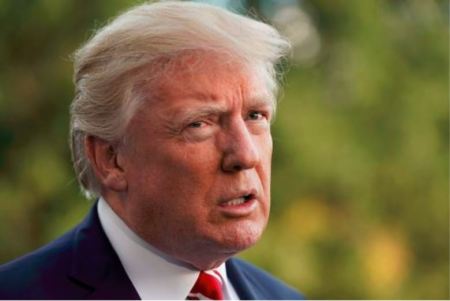President Trump's Mental Health Under Scrutiny

Questions have been raised about President Donald Trump's mental health, with many pundits and even mental health experts believing that that the billionaire real estate mogul is mentally unstable and even "dangerous" for the nation. But others believe that such as claim is nothing more than a political campaign to delegitimize the president.
Concerns about the president's mental health have been advanced in the media in recent months, leading some Americans to question whether the claims are merely political attacks or whether such concerns should be taken seriously.
A new poll produced last week by the Democratic polling firm Public Policy Polling indicates that a majority of Americans are uncertain as to whether or not the president is mentally stable.
Public Policy Polling asked 862 respondents who participated in the nationwide survey conducted on Dec. 11-12 to set aside their personal feelings about the president and answer if they "think Donald Trump is mentally stable or mentally unbalanced."
Fifty-one percent of respondents in the survey believe that Trump is "mentally unbalanced," while 44 percent said that they think the president is "mentally stable" and 5 percent said they were "not sure."
The survey, which had +/- 3.3 point margin of error, comes after the bestselling book The Dangerous Case of Donald Trump: 27 Psychiatrists and Mental Health Experts Assess a President, was released in October.
As author Brandy Lee noted in a recent op-ed, the book "became an instant New York Times bestseller" and was sold out in bookstores around the country. The author claimed that the commercial success of the book shows that "our concerns were resonating with the public."
"At no other time in U.S. history has a group of mental health professionals been so collectively concerned about a sitting president. This is not because he is an unusual person — his presentation is almost typical for a forensic psychiatrist like myself whose patients are mostly violence offenders — but it is highly unusual to find such a person in the office of presidency," Lee, a forensic psychiatrist at Yale School of Medicine, wrote for NBCNews.com. "For the U.S., it may be unprecedented; for many parts of the world where this has happened before, the outcome has been uniformly devastating."
Lee argued that Trump has "already exceeded our usual threshold for evaluation."
"Just some of the signs that have raised red flags include: verbal aggressiveness, boasting about sexual assaults, inciting violence in others, an attraction to violence and powerful weapons and the taunting of hostile nations with nuclear power," Lee added. "Specific traits that are highly associated with violence include: impulsivity, recklessness, paranoia, a loose grip on reality and poor understanding of consequences, a lack of empathy and belligerence toward others, rage reactions and a constant need to demonstrate power. Such traits interfere with the ability to think rationally, to take in needed information or advice, to weigh consequences and to make sound, logical decisions based on reality,"
Since October, many have weighed in on the topic and fueled the mental health narrative.
In an op-ed earlier this month entitled "America Is Trapped in Trump's Delusional World," New Yorker writer Andrew Sullivan argued that Trump's unwillingness to accept hard facts shows that "there is no reality outside his own perfervidly narcissistic consciousness."
"Give such a man the power and trappings of the most powerful office on earth, give him a few months, and such delusions will get worse," Sullivan wrote. "Sane men and women are corrupted by the wielding of power; a psychologically disturbed figure from the get-go will degenerate into deeper and deeper forms of madness."
Critics have also claimed that Trump's own White House officials have expressed concern.
Tony Schwartz, a frequent critic of the president who co-authored his 1987 book The Art of the Deal, told MSNBC last month that Trump is a "man who is deeply mentally ill."
"I know that two different people from the White House, or at least saying they were from the White House and that turned out to be a White House number, have called somebody I know in the last several weeks to say 'We are deeply concerned about his mental health,'" Schwartz said, adding that Trump is "exceptionally dangerous" and "losing his grip."
Even some on Capitol Hill have reportedly expressed concern. On NBC's "Meet the Press" on Dec. 3, host Chuck Todd brought up the fact that there has been "a lot of off-the-record concern from senators for quite some time."
"Democrats are giving voice to it. Republicans haven't," Todd said. "Will they?
Danielle Pletka, senior vice president of of Foreign and Defense Policy Studies at the American Enterprise Institute, responded by saying that she thinks Republicans are "going to keep talking privately about the president."
"But I think it serves nobody to stand up and say, 'I think the president's crazy.' He's the president of the United States. And that kind of thing is just, there's no political upside for Republicans, because then the next question is, 'Okay, you think he's crazy, you think he's on drugs, you think there's something wrong with him?'" she said. "These are all the whispers we hear in Washington. Then the next question is, 'So what are you going to do about it?' And the answer is, from them is, 'We don't want to do anything about it.'"
Some in the Trump administration have shot down and refuted claims about Trump being mentally unstable.
CIA Director Mike Pompeo called such claims "absurd" during the Reagan National Defense Forum earlier in December.
"I'll put it in Washington terms — it's demonstrably false," Pompeo said when asked about the issue by Fox News. He added that the notion that Trump has "checked out" is "just not the reality."
"I'm literally with him, the team is with him," Pompeo said. "We've taught him things. ... He's taught us things too."
Moderate Republican Senator Susan Collins of Maine was asked if she is concerned about the president's mental health in an interview late last month.
"First of all, let me say my conversations with the president have given me no reason to be concerned in that regard," Collins was quoted as saying.
Conservative columnist Mollie Hemingway took on the question of Trump's mental health during a segment on Fox News' "MediaBuzz" and claimed that such arguments are nothing more than a "campaign to undermine the president."
"It is a campaign based on anonymous leaks, so it is very hard to determine how much to take seriously," Hemingway, a senior editor at The Federalist, said. "In general, it is people who haven't accepted the reality of Donald Trump winning the election who are making this claim. ... Nobody should be evaluating each other's mental health, particularly not people who are still struggling to accept reality a year after it happened. "
Peter Roff, a contributing editor to US News & World Report, wrote in an op-ed that the claims of mental instability are seemingly part of a "consistent effort to undermine presidential legitimacy" that "has hardened the partisan divisions in the country."
"It goes back at least as far as George W. Bush and, most liberals would argue, farther than that to all that went on leading up to the impeachment of Bill Clinton," Roff wrote. "Some conservatives will even argue it all goes back to Nixon and Watergate which, in their minds, was a bloodless coup led by the liberal establishment and organized out of Ted Kennedy's Senate office. The point is it's hard to get the nation back on track if the country doesn't have confidence in the chief executive's ability to lead the effort."





















